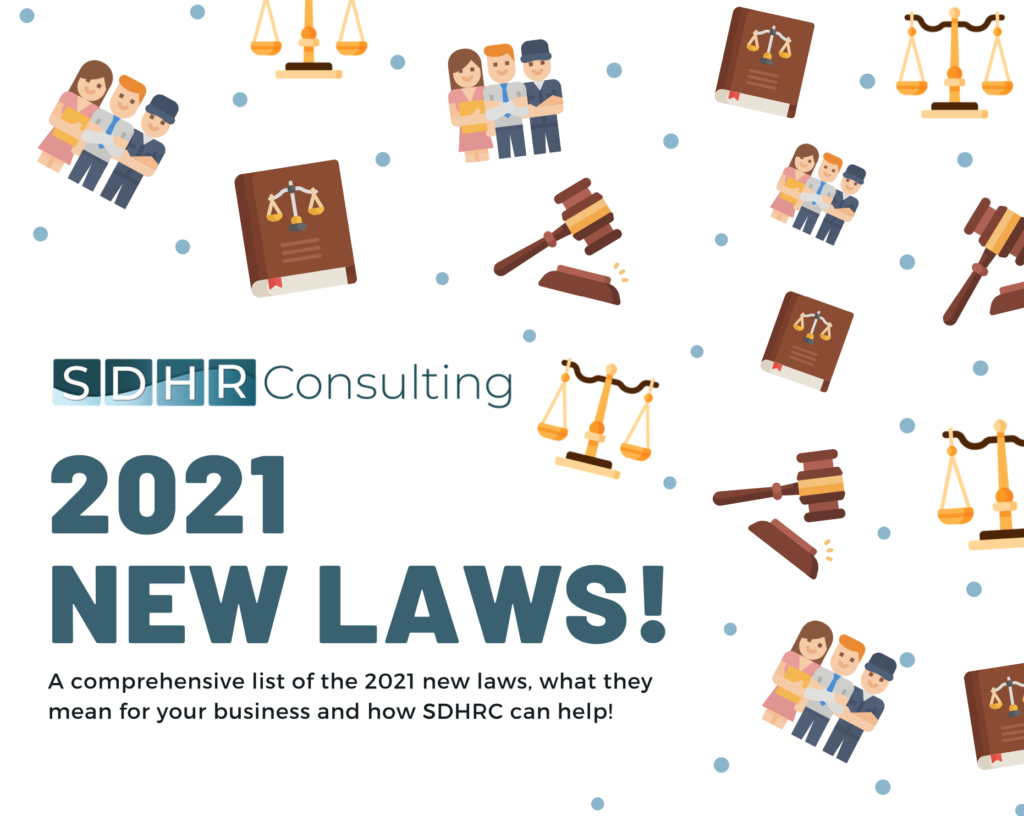
2020 Done, Now to 2021 & it’s Employment Laws
2021 New Laws
The new year is just around the corner and as with most new years, we have some new laws! Below is a list of new laws when it comes to employment, some of which will require employers to update their Employee Handbook and procedures, take action and/or create customized documents.
Starting with the biggest of the new laws that will affect almost every employer:

Expanded California Family Leave Act (CFRA)
SB 1383 is effective January 1, 2021, and extends CFRA coverage to employers with 5 or more employees, counting their employees both inside and outside of California. As with current CFRA and FMLA, there is no geography requirement in SB 1383.
SB 1383 will expand the definition of family members for whom the employee can take CFRA leave, adds leave for military exigency and makes other changes all employers, even those employers who are currently covered by CFRA or the New Parent Leave Act will need to be aware of and update in their procedures and Employee Handbook.
For more detail on SB 1383, please see our CFRA Expansion Blog.

Notice of COVID-19 Exposure in the Workplace
AB 685 is effective January 1, 2021, and requires employers to provide employees with written notice when they may have been exposed to an employee with a positive COVID-19 diagnosis or one who has received an isolation order related to COVID issued by a public health official.
The employer must notify the employees who are at the same worksite within one business day of receiving the notice of the potential exposure. The law has specific notice requirements to be given to the employees. Specifically, within one business day of receipt of notice of potential COVID-19 exposure, an employer must:
- Provide written notice of potential exposure and the disinfection and safety plan the employer plans to implement and include prevention guidelines to all employees working at the same worksite as any individual who has tested positive for COVID-19 or been ordered to isolate due to COVID-19.
- Provide all employees who may have been exposed with information pertaining to applicable benefits, such as COVID-19-related leave, sick leave, potential for workers compensation benefits and protection against retaliation.
- When drafting the written notice, the employer should protect the COVID positive employees’ privacy and not reveal their name, medical or other sensitive personal information.

Paid Family Leave Expanded – Military Exigency
AB 2399 expands the reasons wage replacement can be obtained through the Paid family Leave program. Effective January 1, 2021, Paid Family Leave will include wage replacement for participation in a qualifying exigency related to the active duty or call to active duty of the person’s spouse, domestic partner, child or parent in the US Armed Forces.
Employers will need to ensure they obtain the updated Paid Family Leave pamphlet for distribution to new hires and those eligible for the program once it has been released.

Access to the Company’s Injury and Illness Prevention Program
All employers in California are required to have a current Injury and Illness Prevention Program (IIPP). Effective January 1, 2021, employers are required to provide access to the IIPP to employees within 5 days of a request. The employer may either provide an electronic or printed copy of the plan. Employers may want to consider making the IIPP available to employees at all times via a shared website or company portal.
SDHR Consulting can develop a customized Injury and Illness Prevention Program that meets the requirements laid out by Cal/OSHA.

Protected Time off for Crime Victims
AB 2992 is effective January 1, 2021, and amends the Labor Code to expand prohibitions on discrimination and retaliation for taking time off for victims of domestic violence, sexual assault or stalking to include other crimes or abuse that caused physical injury or mental injury due to a threat of physical injury. AB 2992 broadly defines a crime or public offense as a misdemeanor or a felony committed by a competent adult regardless of whether any person is arrested, prosecuted or convicted of committing the crime. It also requires employers to accept a note written by the employee or other relevant party as proof the employee needs the time off.

Human Resources and Supervisors – Mandated Reporters
AB 1963 is effective January 1, 2021, and expands the list of mandatory child abuse reporters to include human resource employees of a business with five or more employees that employs minors to report suspected child abuse and neglect. Any supervisor who has direct contact with and supervises minors in the workplace are also now considered mandatory child abuse reporters. AB 1963 requires those employers to provide mandated reporters with training on identification and reporting of child abuse and neglect.

Pay Data: Annual Reporting to the State
SB 973 requires private employers with 100 or more employees who are required to file the federal EEO-1 to submit a pay data report to the CA Department of Fair Employment and Housing (DFEH) by March 31st, 2021 and each year after that. The pay data report required by California contains similar data as is required by the federal EEO-1.

Update to AB 5 – Independent Contractors
AB 5 was a hot topic this year including in the Legislature where many bills were considered.
The bill, AB 2257 became effective when it was signed by the Governor in September and adds more exceptions to the AB 5 ABC Test. This includes exemptions for content contributors, narrators, illustrators, recording artists and certain occupations related to sound or musical compositions, photographers in certain situations, insurance underwriters and certain other insurance industry positions, real estate appraisers and home inspectors. All the occupations added by AB 2257 as exceptions are still subject to the Borello test which is a lesser standard than the ABC Test. However, the Borello test still has rules around how much control the employer has over the work of their independent contractors.
AB 2257 also attempts to clarify the AB 5 business-to-business exemptions and to allow for more flexibility in its application. AB 2257 clarifies that a business service provider can provide services to the company’s customers as long as the business service provider also regularly contracts with other businesses. In addition, AB 2257 changes the requirement that a business service provider ‘actually’ contracts with other businesses to the requirement they ‘can’ contract with them.

Doubling the Time for Employees to File DLSE Complaints
AB 1947 expands the Division of Labor Standards Enforcement (DLSE) by doubling the period of time employees have to file complaints with the DLSE.
AB 1947 would provide that employees will have one year from the date on which they are “discharged or otherwise discriminated against in violation of any law under the jurisdiction of the Labor Commissioner” to file a complaint with the DLSE. The bill extends the time in which employees can bring such charges from six months to one year. The one year can be extended for a good cause as determined by the DLSE.
The bill also amends the Labor Code to allow courts to award reasonable attorneys’ fees to an employee who brings a successful action for a violation. Employers are not allowed to collect attorney’s fees even if they are not found guilty of a violation.
This makes it more important than ever that employers ensure they are following all California labor laws such as those pertaining to overtime, minimum wage, meal periods and breaks, timing of final pay as well as many others that fall under the jurisdiction of the DLSE.
Recap of 2021 To-Dos
| Expanded California Family Leave Act (CFRA) | Update Procedures & Handbook |
| Notice of COVID-19 Exposure in the Workplace | Written Notices |
| Paid Family Leave Expanded – Military Exigency | Distribute Pamphlet |
| Injury and Illness Prevention Program | Creation & Access |
| Protected Time off for Crime Victims | Update Handbook |
| Human Resources and Supervisors – Mandated Reporters | Training Required |
| Pay Data: Annual Reporting to the State | Report Required |
| Update to AB 5 – Independent Contractors | FYI |
| Doubling the Time for Employees to File DLSE Complaints | FYI |
How SDHRC Can Help
If you need an Employee Handbook, an Injury and Illness Prevention Program or a COVID-19 Prevention Program after reviewing these new laws, we are experts on creating customized and employee-friendly documents for your company!
Author: Traci Hagan
